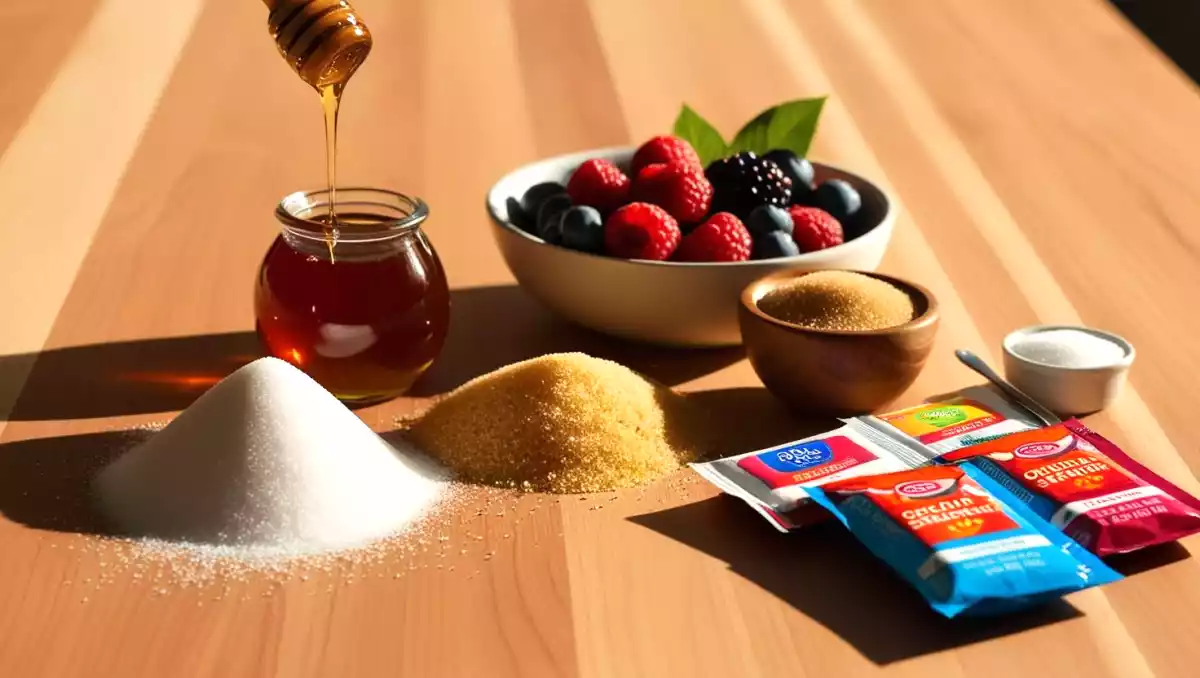Sweeteners: How to control blood sugar without giving up sweets?

Sweeteners are substances used to add a sweet taste to food and drinks and are an alternative to sugar. They are especially useful for people with diabetes, who are trying to control their weight or who simply want to reduce their sugar intake. However, it is important to know the different types of sweeteners, their benefits and possible health risks.
There are two main types of sweeteners: natural and artificial.
Natural sweeteners
They are extracted from natural sources such as plants and fruits. Some examples include:
- Stevia: Extracted from the leaves of the Stevia rebaudiana plant, it is a high-intensity sweetener, it sweetens much more than sugar in small quantities. It has no calories and does not raise blood sugar levels.
- Xylitol: A sugar alcohol found in various fruits and vegetables. It has around 40% fewer calories than sugar and does not raise blood sugar levels.
- Erythritol: Another low-calorie sugar alcohol that doesn't affect blood sugar levels.
- Honey: A natural sweetener produced by bees, rich in antioxidants and with antibacterial properties. However, it is high in sugar and calories and should be consumed in moderation.
Artificial sweeteners
They are produced in laboratories and generally have a much greater sweetening power than sugar. Some examples include:
Aspartame: One of the most widely used artificial sweeteners, present in many foods and diet drinks. It is safe for most people, but some may be sensitive to it.
Saccharin: An artificial sweetener discovered at the end of the 19th century. It has a bitter aftertaste and is around 300 times sweeter than sugar.
Sucralose: Derived from sugar, it is around 600 times sweeter and has no calories. It is considered safe for consumption.
Acesulfame potassium: An artificial sweetener used in combination with other sweeteners. It is around 200 times sweeter than sugar and has no calories.
Benefits of sweeteners
- Weight management: Sweeteners can help with weight loss or weight maintenance, as many are calorie-free or low in calories.
- Prevention of cavities: Artificial sweeteners generally do not ferment in the mouth, which means they do not contribute to the formation of cavities.
Risks of sweeteners
- Side effects: Some people may be sensitive to certain sweeteners, such as headaches, gastrointestinal problems or allergic reactions.
- Controversial studies: Some studies suggest that the consumption of artificial sweeteners may be associated with changes in the intestinal microbiota and an increased risk of some diseases. However, more research is needed to confirm these results.
- Excessive consumption: It is important to remember that sweeteners should be consumed in moderation, as excessive consumption can be harmful to health.
Recommendation
The best way to choose a sweetener is to consult a health professional, such as a nutritionist or doctor, who will be able to recommend the most suitable option for your needs and health conditions. It is important to read food and drink labels to check which sweeteners are present in the composition and to consume them in moderation.
Remember that a balanced diet and a healthy lifestyle are fundamental to health and well-being. Sweeteners can be used as part of a strategy to reduce sugar consumption, but should not be the basis of a diet.
Sources of Information
You may also be interested in:
 Mirella Mendonça
Mirella Mendonça


Comments